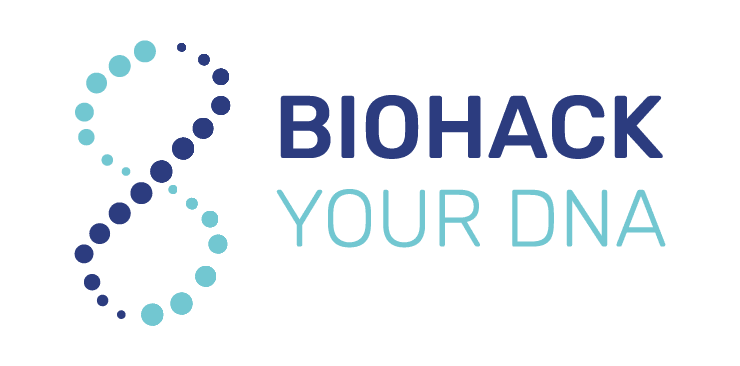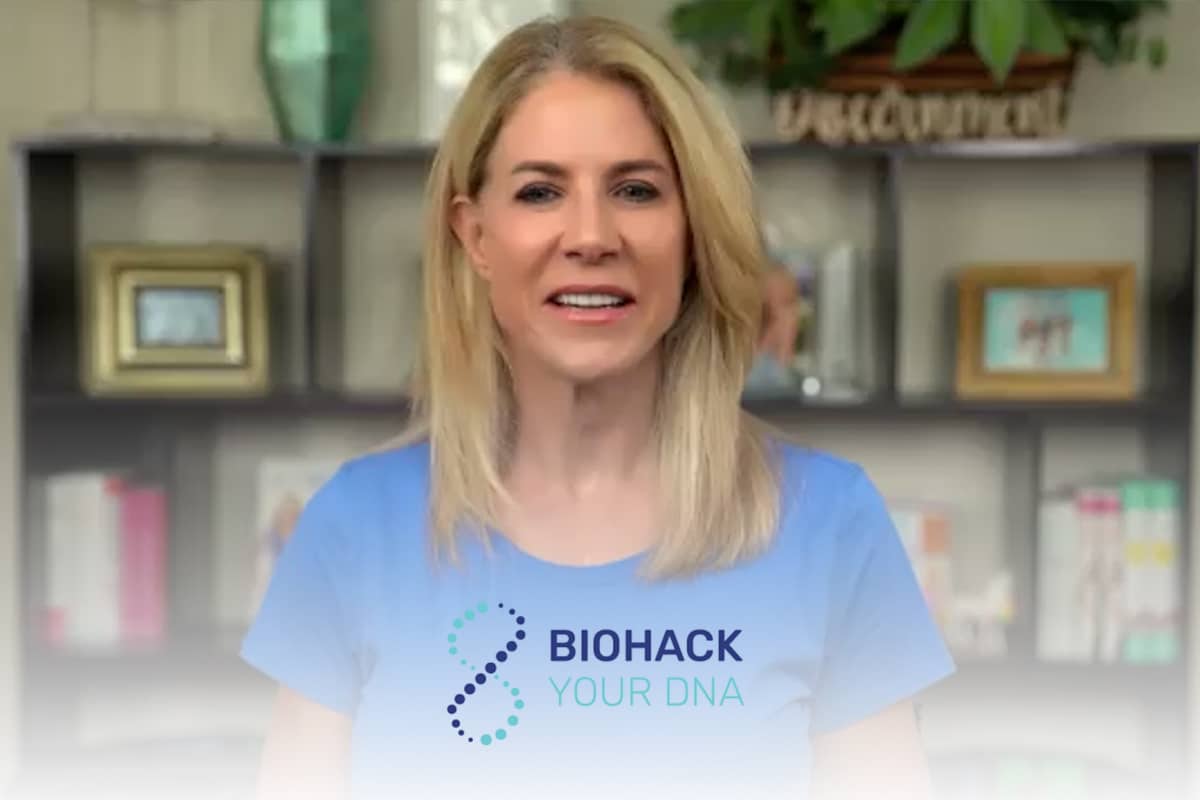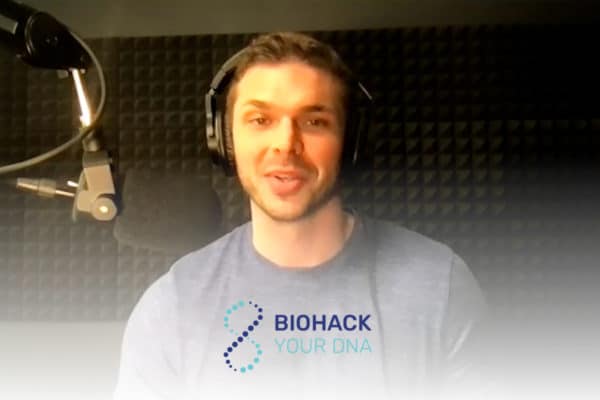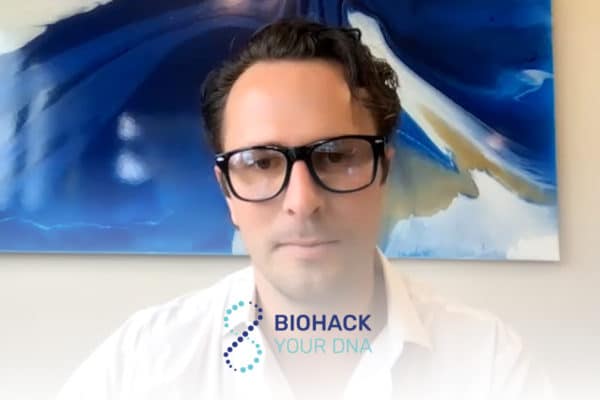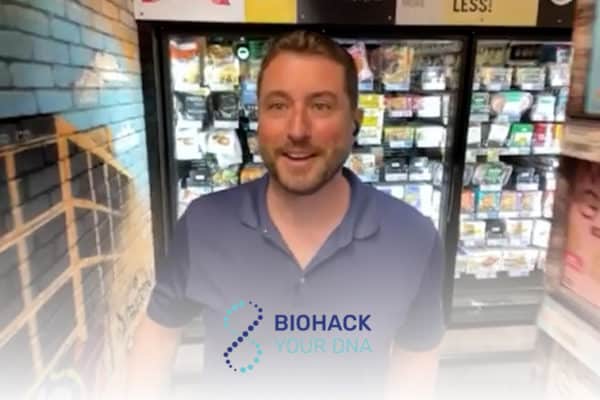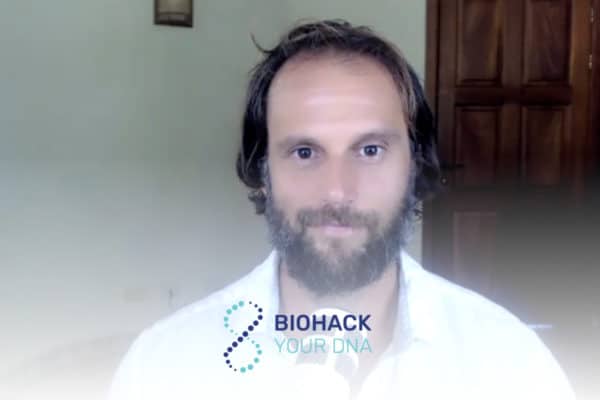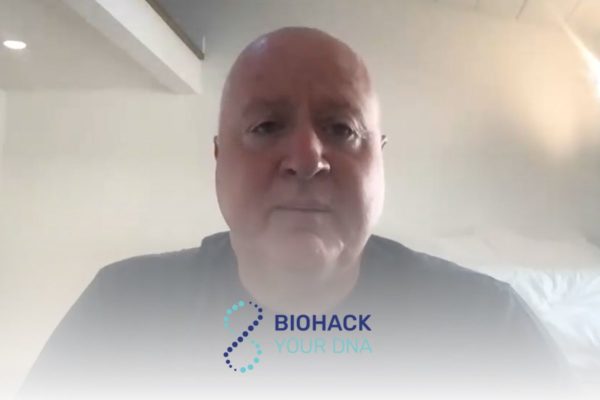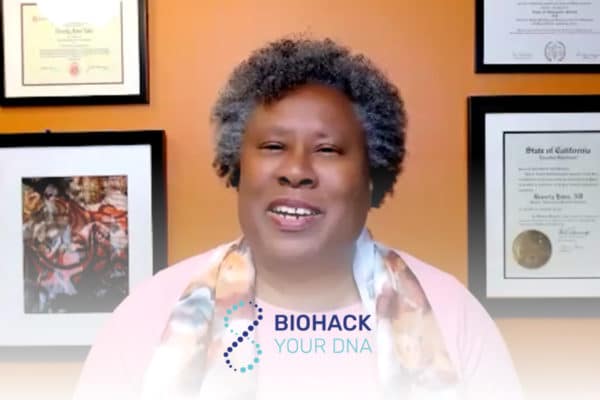Join the discussion below

Kashif Khan is the Chief Executive Officer and Founder of The DNA Company, where personalized medicine is being pioneered through unique insights into the human genome. With the largest study of its kind globally, The DNA Company has developed a functional approach to genomic interpretation overlaying environment, nutrition, and lifestyle... Read More
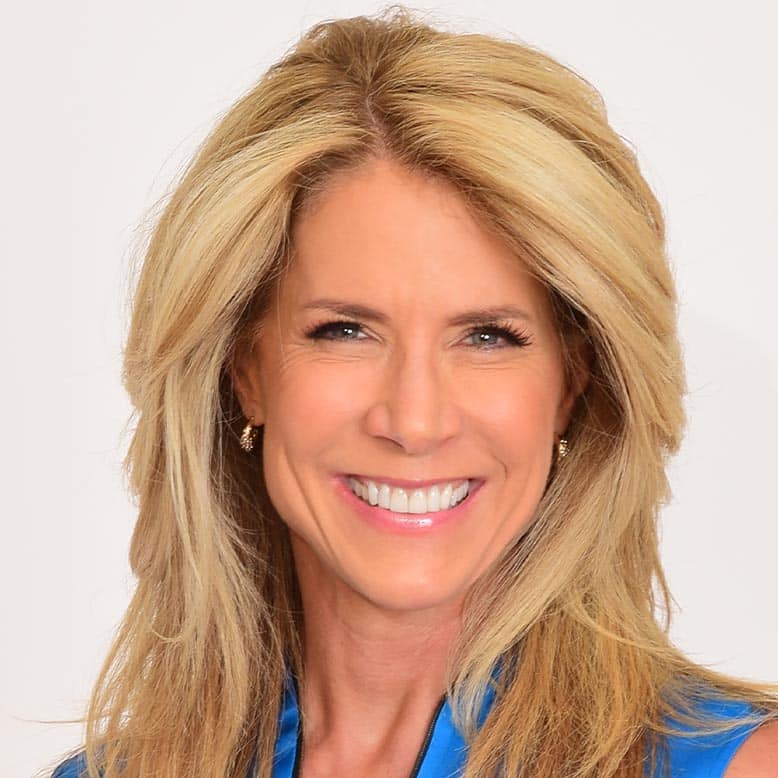
Triple-board certified nutrition expert and Fitness Hall of Famer JJ Virgin is a passionate advocate of eating and exercising smarter. JJ helps people stay fired up and healthy as they age, so they feel the best they ever have at age 40+. JJ is a prominent TV and media personality,... Read More
- How do you know what diet is right for you
- Simple hacks to help stick to your plan
- Can food be therapeutic
Kashif Khan
All right, guys, this is something that I was perfectly looking forward to. Because it’s the thing that I’ve been the most confused by because there’s nobody that knows how to tell me what to do. We’re trying to understand nutrition and we’re blessed today to be joined by JJ. Thank you for joining us today.
JJ Virgin, CNS, BCHN, EP-C
Hopefully I’m not gonna just add to the confusion.
Kashif Khan
Well-
JJ Virgin, CNS, BCHN, EP-C
How’s that?
Kashif Khan
I’ve met you in person, and you look like the personification of proper nutrition. Your skin is glowing, you look healthy, you look like you’re full of energy. Like the world is at your fingertips to explore. I dunno how to explain it, but I felt the vibe like someone’s doing it right.
JJ Virgin, CNS, BCHN, EP-C
There’s something working there.
Kashif Khan
Yeah, and this is where I’ve heard so many times that it’s not enough. You need supplementation, you need medication. You can’t heat yourself to health, but it’s because what we have offered to us as choices often are the right things and the guidance often isn’t correct. But so first of all, it’s awesome to have this conversation today, and let’s start there. Can you eat yourself?
JJ Virgin, CNS, BCHN, EP-C
All right, and for the record, I love supplements. I must say, but we gotta remember what the name is.
Kashif Khan
Right.
JJ Virgin, CNS, BCHN, EP-C
It’s like, hello, there’s supplements. So I started out… I don’t know if you probably don’t know this. I started out as an exercise physiologist. And I was one of the first personal trainers in the United States. I think it started in LA and it was me, Body by Jake and Mark Sisson. And what I discovered very quickly, was that you cannot out-exercise a bad diet. ‘Cause I had people coming in and they go, “I don’t wanna change my diet, but I wanna lose weight and I’m just gonna do it with exercise.” And I’d be like, “All right.” Doesn’t work, does not work. And if you really wanna change your health, you’ve got to change what’s at the end of your fork. And that’s awesome. Because think about what kind of control that gives us.
The problem is that there is so much misinformation out there and we are duped by it. And so I think back just when I very first started to pull people off of gluten, and this one girl came into my office and was so proud of herself ’cause I pulled her off gluten because… And this was a crazy story. She was this Indian girl. Her dad was super, super successful guy, so she was going to all the top doctors. And they all thought she had an eating disorder because she was really skinny and she was a dancer. But she’s sharing what she’s eating and she’s like stuffing her face. And I go like, “Anyone ever tested you for celiac?”
Like something’s up here. And so I pulled her off of gluten. I was like, bam, change right away. But she comes in, she’s so thrilled with herself because she’d gone and found gluten free cupcakes and cookie. I was like, no, no, no, no junk food. So I do think it’s really challenging because there is so much misinformation out there. I’ve had the good fortune to interview tons of people on food. And I will share that there are some common things that we all… Like you could put 10 doctors and nutritionist in a room, we’ll probably fight about a lot of stuff, but there’s some basics that we can talk about today that we pretty much all agree on. Whether we’re keto, paleo, carnivore, vegan, blah, blah, blah.
Kashif Khan
Yeah, you don’t see much agreeance online these days. It’s always, everyone’s got their sort of stick because that’s how you stand out. And often we find that it’s more about that than it is the value they’re trying to provide. How do I break out of the noise and become a thought leader with my sort of focus? And that focus often becomes too narrow. If it’s just carnival, carnival, carnival. Yeah, that might work for somebody, but how do we… So how do you get away from that sort of generalization? How do you figure out what works for you?
JJ Virgin, CNS, BCHN, EP-C
Exactly. And here’s the thing that I’ve noticed being around and having all my friends are in the business. Is I have noticed that people will get a diet that works for them and then they are like, “You need to win it with everyone learning, that’s the diet for everyone.” I’m like, no, that’s the diet for you. And there are some foundational things that are important, which we can talk about and I call it eating by the plate. And then there’s gonna be that variability. And it’s like, it’s your genetics, it’s your lifestyle, it’s your goals, it’s your taste and preference, it’s your microbiome. Like, there’s all these different things that can come into play, and what you ate in your 20’s to feel great may not be what you wanna be eating in your 50’s to feel great.
And it’s not just of course what you’re eating, it’s also when you’re eating it and how you’re eating it. Because there’s a big difference between rushing to an appointment, being stressed out and scarfing down food in the car, versus saying a little intention before you eat and calmly eating and putting your fork down between bites. Something I have to remind myself to do all the time. So there’s more to the picture with all of this stuff, but there are some fundamental things that don’t change for anybody. And the fundamentals are, we have to have protein, fat, and water to live. We cannot live without those three things. We can live without carbohydrates.
Kashif Khan
Great.
JJ Virgin, CNS, BCHN, EP-C
And what’s really bizarre is that in the United States, they build this food guide pyramid that’s now called MyPlate. And when I call it eating by the plate, I’m not talking about that plate. And they built it around the one thing that we can live without. So I’m always going, there was like no people group in history that ate the way the food guide pyramid was created. And so, it’s kind of a head scratcher. But what’s happened when we look at what’s happened now with people following that if they really have, is that we now have more disease than we’ve ever had. So clearly something’s not working. And if you really look back, like when I wrote “The Sugar Impact Diet,” I did a historical view of sugar and discovered that a lot of this shifted, and it’s based on misinformation from this one guy who misinterpreted the seven sisters cholesterol study, decided that fat is what makes us have high cholesterol. Fat is bad.
And where on the other side you had like, sugar is the problem, sugar is the problem. And I forget his name, but he got, I think it was Bruce. No. He got completely blown apart that he was like crazy quack. And this whole idea that fat was bad got out there. And I think, you see now we’ve got approaching now 80% of the population in the US is overweight or obese. 40% is obese. Only 12% before the pandemic were metabolically healthy. That means that we probably have eight… And by the way the parameters they gave for metabolically healthy, I don’t think are where they should be. They’re not optimal. So we have a big problem on our hands. And the way we start to fix it is with food, which is, if we can kind of sift through the noise, is fantastic. And one of the things I think we really have to look at is there’s a couple problems. The first problem being that the word diet means some very different things. It means the way someone might eat based on their ethnicity and traditions. It means going on the carnivore diet, or it means what we eat every day.
And we kind of need three different words. And what I see with a lot of people is that dieting becomes a hobby. And they jump from thing, to thing, to thing, instead of using diets therapeutically to learn something about your body or make that change you wanna make, and then figure out what has to come from that diet into your everyday life to make you live, so that you feel great, that weight loss is effortless and that you have good metabolic health. And so I approach the whole thing as the very first thing that you should do once you’ve committed to your health as the single most important thing. Because if you don’t have your health, you don’t have anything. You’ve heard that saying that, “he who has his health has a thousand dreams and he who doesn’t has one.” So obviously, and having had a child who nearly died, there’s nothing else that’s more important.
And the single most important thing of course would be changing what’s at the end of your fork. So once you decide that you are important and worthy enough to do that for yourself, and that if you really want to go out and change the world and do things in life, you gotta then make healthier number one priority. Then the first thing that I think people should do is start to add before they think about what they can’t eat, think about what they should be eating. Because the minute you start to take things out, and I don’t know about you, maybe I’m just rebellious or naughty. But like, could you tell me I can’t have something, it’s what I get fixated on, and what you focus on expands, right?
Kashif Khan
Yeah, for sure. And people are… It’s much harder to give up than it is… You’re gonna eat anyway, you might as well be eating something that’s useful.
JJ Virgin, CNS, BCHN, EP-C
Yeah, so start eating the good stuff to crowd out the bad stuff. ‘Cause look at little kids, they get full. And now I can’t eat dessert. Like no adult ever says, “Oh no, I can’t eat dessert ’cause I’m full.” It’s just like what? So I think that the first place to start is to go, all right, what if we just started to think protein first? Because we need protein, fat and water to survive. And I gotta give you something I got from Dr. Gabrielle Lyon that I think is just the craziest thing ever. And she’s gonna put this in her book, so it’s gonna get out everywhere. So she practices muscle centric medicine, and she was looking at protein requirements. And what she discovered was during world war II, when they were doing food rationing, they changed the protein recommendations in the United States, because they needed to be able to have more protein to send to the troops.
Kashif Khan
Oh wow.
JJ Virgin, CNS, BCHN, EP-C
They never changed it back. And so you’ll hear like there’s all this protein phobia in the United States. There’s all this, “Look, don’t have too much protein, it’s hard on your kidneys.” And yet we’ve got osteopenia. Like if you look at what happens as people age, the most important thing you can do is protect your lean muscle and have great bones. And you need protein to do those things. And you get a little protein resistant as you age. So in especially with people trying to lose weight, protein is 20% more thermic and it’s way more satisfying than the other foods. And it’s not gonna give you that big insulin response. So I always tell people like first thing is to make sure you’re getting quality protein at every single meal.
And I think that you need at least one gram per pound of lean body mass, that’s the floor, that’s the least amount. And so that means you should know your body composition. So you need to get a scale and know how much of your body is muscle lean tissue and how much your body is fat with the goal of always optimizing that lean tissue. ‘Cause if you do that, you’ll burn the fat. Instead of focusing on like all this gotta lose weight, you actually don’t wanna lose weight. You wanna hold onto or build muscle. Like you just wanna make sure you do not lose any of that. And if you do that, you then you’ll start to lose some fat. So you gotta prioritize protein to do that. So that’s the first place that I always start. Is like, let’s make sure you’re getting enough protein ’cause then you’ll actually be satisfied and satiated and you won’t wanna overeat like you do on carbs.
Kashif Khan
The interesting thing about what you’re saying. So my first thought when you started was, JJ’s saying all the right stuff, but how do you do this without the trial and error? Because there’s so many options, there’s so much noise. There’s so many opinions what to do that. But there’s no… There are some tests, like you said, there’s genetic, there’s blood markers that can drive you. But if you don’t have that, it’s kind of your testing what makes you feel good, what doesn’t make you feel good. But you’re breaking it down to the very, very pillared fundamentals of eating, which is let’s start with protein, fat and water.
JJ Virgin, CNS, BCHN, EP-C
Yeah, well, but I actually those are the things we have to have, but I’m gonna tell you some of the ways. Like if I’m adding, ’cause I like to do, add before you take away. Detoxify, heal your gut, balance your blood sugar. Like, so I have a whole process I go through. But I think if we are just gonna focus on a few things, because I love testing. So love testing. And I also believe in daily monitoring of your sleep, of your blood sugar, you can see I’ve got a little Nutri sense on, and your body composition. Because if you optimize your body composition, making sure that you’re holding on or building lean mass, which is how you become more insulin sensitive so your body’s able to burn fat. And by the way, 50% of people who look normal weight, are actually something called TOFI, thin outside fat inside. If they’re just trying to control their weight through diet, and they’re aging, they’re losing muscle. And if they’re losing mu…
Like, you can never look at just your weight. In fact, I just had a guy I started working with and I love weight loss resistance. So people who cannot lose weight, they’re my people, I love working with them. So he comes in and he’s been working with all these top doctors, nothing’s changing. So I start tweaking his diet and messing with it. And he’s already exercising, he’s doing cold exposure. And the cool thing is he was going and doing a DEXA body scan once a month. So I could see not only how much body fat and lean tissue he had. So you basically look at two compartments in the body, fat and everything else. The DEXA is gonna not only tell me that, but it’s gonna tell me exactly where the fat is. So I’m seeing where he is losing it. So I’m tweaking, tweaking, tweaking, and taking him into a ketogenic diet and messing with him to see which things are working. And his weight is not changing. He is getting so frustrated and his weight is not changing. And over three months, his weight went down a pound. But over three months he put on 10 pounds of muscle and he lost 11 pounds of fat.
Kashif Khan
That’s phenomenal.
JJ Virgin, CNS, BCHN, EP-C
At 58, like that is crazy amazing.
Kashif Khan
Yeah, that is phenomenal. And that’s what people don’t get that one number, that one metric here, what’s my weight. And it’s easier now. I understand it used to be challenging a few years ago, but like you said, there’s equipment-
JJ Virgin, CNS, BCHN, EP-C
Yeah, now it’s easy.
Kashif Khan
Yeah, now it’s possible. There used to be a challenge, it’s made easy, so take advantage. So what do you do with a person like that? When they’re 58, the hormones aren’t there to support it, the metabolism isn’t there to support it, but yet you made it happen.
JJ Virgin, CNS, BCHN, EP-C
Yes, well, again, I have food and lifestyle as my tools. That’s what I got. So I’m gonna of course go work with some doctors to get them hormones and peptides and all that if they need it. But I always start because I wanna see how far you can go with food and lifestyle. Because maybe you won’t need any of the other stuff. And I love putting some genetics in because then I can know if there’s things that I have to include right away with supplements because I’ve gotta push a pathway. But I love the fact that I can only use those tools, because if I’m starting to work with someone with diet and going, wow, like if that’s not changing, then I know I’m gonna have to look at some hormones.
But a lot of times you can do so much with diet, and exercise, and meditation, and sleep, that will improve all these other things that you may not have to go there. And if you do have to go there with any kind of hormones or prescriptions, you can use a lot less because you’ve got the body working correctly. Otherwise you’re just putting in a big bandaid. So I like to push protein ’cause I know it’s gonna help with satiety and metabolism. Everyone wants to speed up their metabolism. And I wanna make sure we’re getting a lot of water in between meals. If you’re just even one or 2% dehydrated, you’re raising stress hormones. So I wanna make sure we got that water to detoxify to keep metabolism up. And then the next thing I add in is a lot of non starchy vegetables. Because most people are not getting…
Like if you took potatoes and ketchup out of the diet, people would not buy them, the average American would have no vegetables. So you’re like, oh boy. Our vegetables are iceberg lettuce, and pickles, and ketchup. So that’s the next place I like to start adding in some non starchy vegetables. And then of course, making sure that we’ve got those good, healthy fats. When you look at like what will people agree on, one of the biggest dangers to our health now are these damaged bad oxidized fats. They’re so damaging, so inflammatory, so problematic. And what’s really discouraging is you can walk into a health food store and think that you’re getting everything good and they’ve got cannoli. And you think that you’re in a safe place.
Kashif Khan
Yeah, exactly. And that education, that’s where you can’t take for granted that the packaging and I don’t just mean the packaging, like even the packaging of the store you’re walking into, you said, right?
JJ Virgin, CNS, BCHN, EP-C
Right.
Kashif Khan
You have to learn and know how to read labels. Very basic thing but people don’t do it. So this guy for example, even that one skill or trait, he’s working with you, he’s blessed to be able to work directly with you, but eventually he’s gonna go on, on his own. And that’s where people sort of fall off and they don’t comply. How do you get it to stick?
JJ Virgin, CNS, BCHN, EP-C
So this is someone who is super duper wealthy, has not one but two planes and has a chef. But he travels all the time. And I’m like going, it’s easier when you travel, I’m kinda like your big baby, stop it. But what we did, this was the chef’s idea. And I went, “All right, that’s the smartest thing I’ve ever heard, I’m stealing it.” I gave them exactly… I like when you break your fast each day, I like to break the fast with what I call a loaded smoothie, which is protein first in your smoothie. And so good protein powder, extra collagen, so we kick that up. Some good healthy fats with maybe coconut milk, a little avocado. And then depending on what you’re doing that day, like, I don’t really do any fruit or anything in the morning ’cause I just feel better being like super low carb in the morning.
So it depends on if you’re doing that or not. But so the smoothies were easy for him to be compliant with. But what we did for his meals was the chef had this card made that said what he couldn’t eat. Because in the Virgin diet, I have you pull out gluten, dairy, eggs, corn, soy, peanuts, and of course sugar and artificial sweeteners. And then we rechallenge. I knew I wanted to keep him off gluten and turns out he did have gluten dairy. Obviously he had sensitivities to both of those, gluten I don’t think anyone should be on. And then obviously I don’t want him on soy, he’s a man. And I didn’t want him on corn. So we just wrote out a thing that said what he couldn’t have at the restaurant and how to make his food. So he could have simple grilled fish or grilled grass fed beef and loads of vegetables.
Could use olive oil, or avocado oil, or coconut. So there’s plenty of stuff that he can have. And so the chef just knew to make sure that he was… And it’s so much easier now. Like it used to be like, if you couldn’t have gluten, it was like really challenging, but now it’s not. So that’s what we did for him. And I think here’s the thing. It sounds like you… Let’s just take, okay, we’re gonna pull out bad oils, gluten and sugar. ‘Cause if we just did those three things, huge stuff would happen. Most people would go, oh my gosh, there’s nothing left to eat. I said all we pulled out is gluten, bad oils and sugar. We have berries, avocado, fish, grass fed beef, wild rice, butternut squash, like lentils, tons of food.
Kashif Khan
Yeah, the majority of everything else that was left.
JJ Virgin, CNS, BCHN, EP-C
Yeah, you just can’t have oils.
Kashif Khan
Yeah, and I think that the thing when I listened to you, it’s kind of what you did for this gentleman, is you gave him like an identity shift. Meaning that the habit was hardwired to the point where it’s almost like here’s my identity, this is my card, this is what you gotta do for me. And people gotta realize that to get to that, again, you can have a coach that guide you through it. But it takes weeks, it’s not overnight where you believe then you have the confidence even to walk into a restaurant. But if you had a peanut allergy, you tell people you have a peanut allergy. You gotta be that level of conviction where this is my identity and this is who I am. And that again, allow it to take weeks for it to settle in and become sort of who you are. There’s something you said there that I just wanna ask you outta my personal curiosity, you talked about artificial sweeteners and I’ve heard so much contradicting stuff there. Are there any stevia, monk fruit, are there any that are worth having or are they-
JJ Virgin, CNS, BCHN, EP-C
Well, those are not artificial. And that’s the key critical thing, but there is a caveat with those as well. So there’s sugar, there’s natural sweeteners, and then there’s artificial sweeteners. Three different things. Now with sugar, so I wrote “The Virgin Diet.” And by the way, when I wrote “The Virgin Diet” at first, when I first was doing this work with clients, it was pull out these six foods, gluten, dairy, corn, soy, eggs, peanuts. And we’re gonna take ’em out, we’re gonna let your body heal and reset. And then we’re gonna see which ones work for you and which ones don’t. Of course, the hardest thing was getting ’em to add ’em back in, ’cause they felt so good. They’re like, “I don’t need those anymore.” And I swapped them with other things so they didn’t miss it. But what I discovered, was that if I didn’t pull out sugar, which was disrupting their gut microbiome and creating some of the leaky gut.
That if I didn’t pull it out, they just ate more of it. I’m like, all right. So that’s why that it got added in. And there was so much confusion around sugar. They’re like, but it’s honey. I’m like, that’s sugar. And here’s the thing, all carbohydrates turn into sugar except for fiber. It’s just a matter of whether you’re mainlining it with like apple juice concentrate, or honey, or coconut sugar, or if you’re making it slowly from like an apple, or squash, or wild rice. So which is it? Are you slowly doing it or are you like jamming it up? So we obviously wanna make it slowly. And so that was the first thing was helping people understand the difference what sugar impact is. But to also understand that artificial sweeteners have no place in humanity. Maybe to kill bugs.
Kashif Khan
Oh wow.
JJ Virgin, CNS, BCHN, EP-C
And I had a great nutrition mentor early on. He said, you’ve look at things like margarine and artificial sweeteners that you can literally put outside and the bugs won’t touch them. Like if a bug doesn’t want to eat your food, there’s something wrong. Or if you can keep your food and it’s fine forever Twinkies, something wrong. So artificial sweeteners have so many issues. As you know, they disrupt the gut microbiome and they can make you glucose intolerantly to diabetes. Just the seizure activity, all sorts of crap. They’re just bad news. But in between those are natural sweeteners. Things like stevia leaf or monk fruit that are naturally sweet. And so those are my swaps to use with a caveat. There was a study where they took rats and they fed them sugar water.
And then they allowed them to feed and they ate exactly what they needed to maintain their weight. Then they gave them an artificial sweetener and they allowed them to eat. And they ate what they needed to maintain their weight. And then they went back to sugar and they overate, because they lost the ability to calibrate, to correlate degree of sweetness with the amount of calories. And so that is my only… There’s two concerns with stevia and monk fruit. And I will say, I use them, but with this word of caution. What happens when you eat something sweet? You want more sweet.
Kashif Khan
Want more?
JJ Virgin, CNS, BCHN, EP-C
Like, Ooh. So the thing with those is you’ve gotta be cautious with them, they’re not a free for all. So you use them, but be aware. I really love allulose because it has a little bit of calories, but it’s not absorbed, it doesn’t give you gas like some of the things like xylitol can do. But it also helps with insulin sensitivity. So it’s actually a pretty interesting one. So I use those sweeteners, but I also think that we need to… And this is what I did in the sugar impact diet. I took people through a process so they could retrain their taste buds to appreciate sour, and spicy, and salty. And it turns out that sour can take your sweet tooth away. And I really believe that if you’re more blood sugar balanced, you’re eating protein, which is more satisfying and slows down stomach emptying. So you feel fuller longer.
You’re getting that with the fiber from non-starchy vegetables and low impact carbs. Things like wild rice or lentils, things that take a while to turn into sugar. That give you that fiber that’s nourishing your gut microbiome and also slow that blood sugar response. And then you have the healthy fats that are also trigger the release of chemicals into your brain to tell you that you’ve eaten and they’re insulin neutral. And they also reducing inflammation. So you’re putting that stuff together. You should have good blood sugar balance. And then you won’t have those sugar gradings that people have when they’ve been eating more carbs. Their body gets used to handling more carbs. As it’s getting more carbs, blood sugars up, insulin’s up. Insulin is slow acting. So if you’re eating little bits of food all throughout the day, like we were taught to do when they pulled the fat out of our diet and we were hungry all the time, you start to become more insulin resistant because you get blood sugar up, insulin comes up, bring sugar back down, insulin slow to respond. So then you eat another little thing, blood sugar comes back up. Insulin’s still there, it goes up a little bit higher. This keeps going on, your receptors start to get fatigued.
They can’t hear it anymore. You keep having to push more insulin out to get the same response for your blood sugar. And pretty soon you can’t reach your fat stores to use stored fat for fuel, so you’re having to eat every couple hours. And you know you’re like this if you cannot lose your belly fat and you can’t go more than a couple hours between meals. And you’re always a little bit hungry, you’ve never forgotten a meal in your life, you’re a sugar burner. You lose weight, but you don’t lose your waist. You’re a sugar burner. So we don’t wanna be that way, so if you can start with that plate of getting the protein, getting the healthy fats, and getting that fiber, and that really helps with the satiety and drinking lots of water in between meals. ‘Cause everyone knows you quite often aren’t hungry or thirsty. And giving your body that break in between meals.
That four to six hours in between meals and that 12 hours plus overnight, hopefully it’s more like 12 to 14 hours to 16 hours, so that your body has time to start doing some self cleaning. And it makes a huge difference. So that’s the kind of simple things. And I will say that it’s rare now. There’s like some occasions where you have to give people more than two to three meals a day where they have to add in something. But if I’m working, I used to work with a lot of athletes, pro athletes. And when I had to keep their muscle mass on, I had ’em eat four meals a day, every four hours, protein heavy. But for the rest of us, ’cause that’s not 99% of the population, two to three meals, lots of water in between. Shut the kitchen three to four hours before bed and stay out of there, put an arm guard in there if you need to.
Kashif Khan
Yeah, that’s it. Have the habit alarm clock set and you no longer enter the kitchen.
JJ Virgin, CNS, BCHN, EP-C
Like in the perfect world, this kitchen, which always seems to be the focal point and everyone’s hanging out in there. It should have some thing, like it should be a self locking thing. And like seven o’clock that sucker’s done, you cannot get in there, like it’s close.
Kashif Khan
So everything you have spoken of so far, if anyone were to just say I’m doing everything that JJ said today, I’m sure you’re gonna be a different version of yourself by the time you come out. The other end, a question I have for you is, what we’ve been talking about is weight optimal version of yourself. Can you also look at food as therapeutic for somebody who’s more suffering from a condition or some chronic state. Can you use it to heal as opposed to just being optimal on the way you eat?
JJ Virgin, CNS, BCHN, EP-C
So when I started all this, I was obsessed with weight loss and weight loss resistance. And so that was my focus. And then that’s where I started working. And then I discovered this food sensitivity thing because I was teaching for MetaMetrics and designs for health. So I was teaching this lab testing and part of it was a food sensitivity test. And so then I realized that actually you didn’t have to do the test to figure out the most core areas that you were having issues with. And I was using it because what I discovered was when people pulled these foods out that weren’t working for them, they had fast weight loss, fast symptom relief, and then they felt so good, they didn’t want to go back. So it was like lasting, I was like, this is great. What happened that I didn’t expect, ’cause I was using it for weight loss. And then I get a call from someone. They went, “Wow, I have had this tendonitis in my heel and I was going to physical therapy three times a week for a year and it never went away. And then I went off gluten and corn and it went away.
And I’m like, what? And then as it went out and I did a public television special and people started doing the program, this woman emails us and says, “I was on these immune modulating drugs for my autoimmune psoriatic arthritis.” And she could hardly function because her immune system was so depleted from this that she would get sick so easily that she couldn’t work anymore, she couldn’t see her grandkids, just horrible. And she is not on any medication. Like basically, didn’t just get off the medication stop. She starts to reverse the condition and I’m like, whoa. So what I discovered with this, ’cause my focus had been weight loss, that’s what I focused on. All of a sudden, I’m starting to see all these autoimmune people are coming in. I’m like, wow. And then people with chronic gut problems, chronic osteoarthritis. And then when I wrote “Sugar Impact Diet,” I really wrote that one more for people who had diabetic. Anyone insulin resistant, diabetes, elevated cholesterol.
We look at cholesterol so wrong. So that’s a whole another thing. But I really looked at that one, ’cause I think we use diets therapeutically. So when you really look at “Virgin Diet,” it really is for autoimmune conditions, super duper helpful, super important thing to look at. And I had a great mentor early on who said, “The sicker you are the farther back in your ancestry you need to go.” So I have a paleo version of “The Virgin Diet.” It’s fairly close anyway, that works really well for autoimmune conditions. And then the next one was sugar impact. Again, I just was going, what was the next problem? Well, the next problem was the people that did the Virgin diet, there was a group of ’em that couldn’t quit sugar. I’m like, all right people, I’ll do this. But what I really discovered there is for the person who’s really struggling with blood sugar control or cardiovascular stuff, this is the perfect place for them to be. And then the kind of advanced level of that, that I’m redoing the program for, is that I believe that you should not just step into intermittent fasting and you shouldn’t just go do a ketogenic diet. You have to get ready for these things.
When we don’t feel good, we wanna feel better overnight. But we didn’t get to the point of feeling poorly overnight. Like most of these things that we get to have been years in the making. And so you need at least like a couple months. Like people always wanna, I wanna lose weight tomorrow. I wanna get rid of my blood sugar issue tomorrow. But we can get you quick wins really fast, but then you have to go through the work. So those diets are really set to fix those things. And the sugar impact diet prepares your body so you can easily do intermittent fasting. Because now you have transformed into a fat burner. So you can extend those times without having challenges. Now you can play around if you wanna do some cycles of ketosis. ‘Cause I believe in exercise and I started as an exercise physiologist.
And in exercise, everyone knows to cross train. That’s what you do, you cross train exercise. Why? So that your body continues to progress, so that you don’t get injured so that you don’t get bored. Why aren’t we doing that with diet? We should be doing it with diet. And when I say diet here, I mean the way we eat. But what if like now I really wanna focus on maybe some advanced detoxification. Or maybe I wanna focus on some gut healing or blood sugar balance, well, then I go and grab like say blood sugar balance. I’ll grab sugar impact diet, go through it and then start maybe doing some cycles of ketosis. Or doing maybe one meal a day intermittent fasting. I’ll play around with that. But that’s, I think we need to reframe how we eat to really look at what do we need to do. And it’s not the same thing every single day. You wouldn’t do that with your exercise. Wouldn’t make any sense.
Kashif Khan
Yeah, and that’s a very key thing you just said is, we’re all focused on what we eat. Very few on how can have such a huge effect, something as simple as a eating schedule, like you said. In time on and off time metabolic activity or not metabolic activity. But the how thing is so crucial, and nobody talks about the cyclical modality of like let’s shift gears, get into ketosis, burn some fat, but let’s go back to something else and allow your body… And what that may do for your gut microbiome in order to populate variety of healthy flora as opposed to just one thing. And maybe that’s the last thing we’ll touch on here. We could go on for another couple hours, but we gotta watch the time. When it comes to gut health, we’ve been doing a lot of talks and a lot of people keep coming back to the gut. Are there key foods that we can even generalize and say that here’s what you should do to heal your gut.
JJ Virgin, CNS, BCHN, EP-C
Yes, the thing you wanna not have is gluten. You cannot heal your gut in any gluten containing grains. Like you just can’t do it because gluten triggers a release of something called zonulin that makes your gut more permeable. So you cannot heal your gut if you’re eating gluten. So that’s the step one. If you’re sitting on a bunch of tucks, and you go, well, how do I get my butt to stop hurting? I’m like, well you gotta take the tucks away first. I can give you a pillow, but if the tucks are still there, we got a problem. So it’s really important that you cannot have a healthy gut eating gluten, you can’t, so there’s that. Next, there are so many things that are so good for your gut. Now, sleep is one of ’em
Kashif Khan
For sure.
JJ Virgin, CNS, BCHN, EP-C
And mindfulness managing stress, however, that means for you. Like I finally, years of kicking and screaming and resistance, I’m now a meditator. And meditation is so key critical, sleep is so key critical. You’ve gotta have those things for healing your gut. So I’m gonna throw those ones in there. But what are important? Bone broth super important. So I actually do a bone broth, a shake made from bone broth protein every day, and I throw in extra collagen. And then if you can drink bone broth, even better, all that helps you heal and seal the gut. And then getting in some fermented veggies. I just was got off a call with Dr. Tom O’Brien. I was like, oh my gosh, I’ve gotta get my fermented veggies on a consistent basis. That’s a fail on my part. So I’m gonna say this. I’m always very authentic, I have not nailed this one yet.
I just wasn’t raised with fermented foods and I just . But it doesn’t take much for this to make a big impact and really heal your gut microbiome. This is how you fuel the flora in your gut. So you wanna make sure you’re getting in and it doesn’t take much. It’s like a tablespoon of day of these eating in some good prebiotics. So things like artichoke, so Google prebiotics take get some prebiotic foods in and really making sure that you’re getting good fiber, super duper important. So those are some of the ones that I really look at that are key critical if I had to say the most important things for the gut. And fiber from lots of non starchy vegetables, ’cause all those different colors do different things. And the antioxidants, like if you’re monitoring inflammation, one of the ways we know you can do it on lab tests is through something called highly sensitive c-reactive protein. Now people with more body fat tend to have a higher CRP because body fats its own little inflammatory hot house. So one of the things we found early on is we could lower that CRP by throwing antioxidants at it.
Well, ideally we wanna lose the body fat that’s got the pro inflammatory cytokines. And ideally we wanna put that fire out and make sure we’re not doing things like inflammatory fats with that. But in the interim, one of the things that can help is getting in those antioxidants and the first place you get them is with food. Is with plants. And all those plants with all those colors do different things. So deep green leafies, and beets, and red onions, and red peppers, all this different stuff. So those are the things that I like to start with for food. And then of course, some really good anti-inflammatory fats. Fish oil, like fish proteins actually great for gut healing. Pectins from apples great for gut healing and freshly ground flaxseed meal is another one that’s really great for gut healing.
Kashif Khan
That’s awesome, I’m gonna start on it very soon. Personal challenge for me where since very early on gut issues nonstop. I’ve learned that genetically I’m literally missing key genes that help me detoxify the gut, which is why there’s for me. And so many people that we see, by the way that one particular area, this is not like a 2 or 3% problem, this is like a 40% problem. And you wonder why there’s so many gut health issues. The key genes that help you protect that gut lining detoxified, draw the chemicals, and pesticides and all the chemicals that process your food out. Most of us don’t do that well.
JJ Virgin, CNS, BCHN, EP-C
Yeah, and then you couple that with a food supply that’s a disaster. Just like a disaster. And apples can be great, but they are a pesticide crop. So you have to get those things organic. So we really have to watch these bad seed oils. And you look at gluten and you go, okay, is it the gluten or the glyphosate? And like, it’s all. So we just have a mess on our hands. And it takes a little while to shift and kind of learn new things that you’re gonna be doing. But then you’re just, once you got it figured out, it becomes easy.
Kashif Khan
Yeah, well, J, this was awesome. I honestly, I feel like I could go for another two hours because it just felt like 10 minutes, it flew by. I wanted to thank you also. And let everyone know that you’ve offered up your “Smoothie” book, which I’m gonna use. Because literally just yesterday I threw a bunch of stuff into the Vitamix pressed the wrong button and it all exploded onto my ceiling.
JJ Virgin, CNS, BCHN, EP-C
We’ve all done that. That’s why I switched to a NutriBullet because you can’t mess it up. It can’t explode off on, unless you put sparkling water into a NutriBullet in which case it explodes by the way.
Kashif Khan
Yeah, no kidding.
JJ Virgin, CNS, BCHN, EP-C
We also discovered that.
Kashif Khan
So I urge everyone, sign up for that. Get the free copy that JJ was so kind of offer everybody. Thank you again for joining us. This was mind blowing information. I’m sure there’s gonna be a lot of guts, and bodies, and minds healed because of this. Thank you again.
JJ Virgin, CNS, BCHN, EP-C
Thank you all.
Kashif Khan
All right.
Downloads
